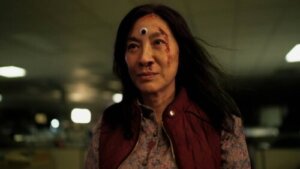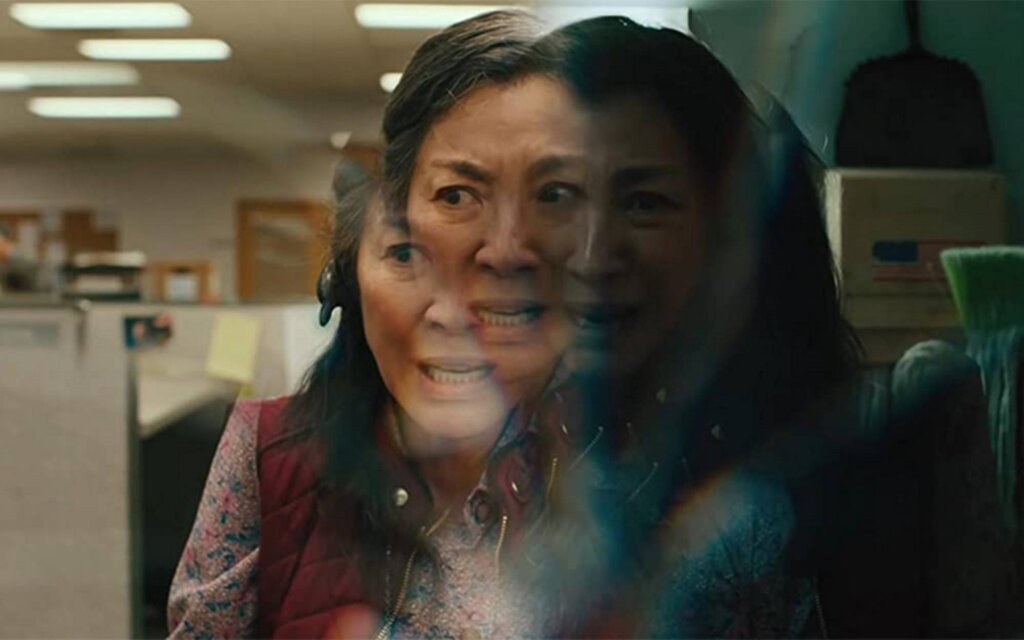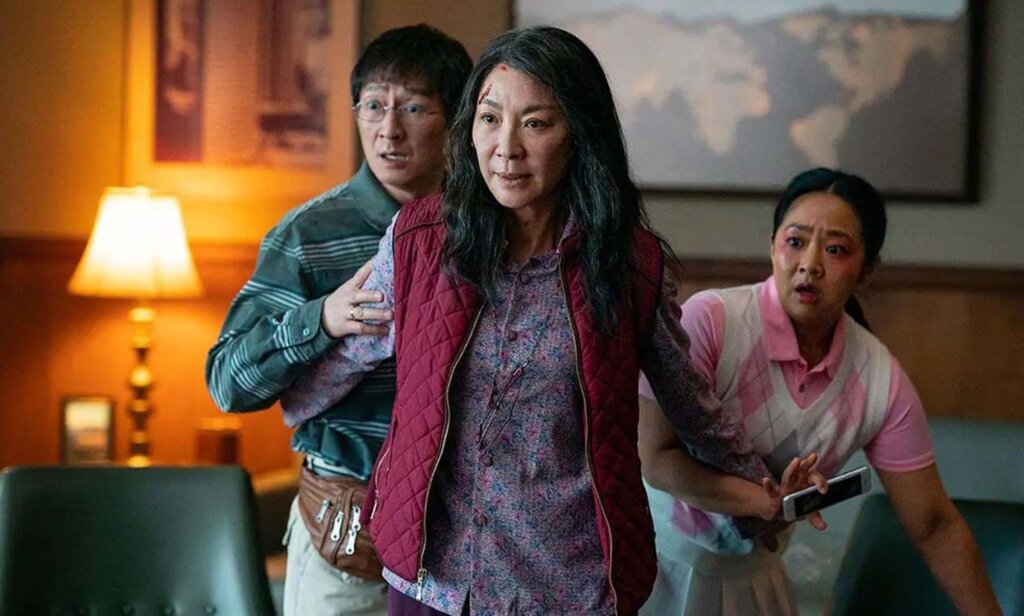Everything Everywhere All at Once: A Reflection on Existence


Written and verified by the psychologist Valeria Sabater
Chaotic, wonderful, a cinematic absurdity, a creative symphony, and even a galactic-cerebral nightmare. Everything Everywhere All at Once, the overall winner of the 2023 Oscar ceremony, has been defined in many ways. However, behind the apparent surrealism of the latest production by Daniel Kwan and Daniel Scheinert, lies a solid psychological and moral foundation.
The movie tells the bittersweet story of a woman who hasn’t fulfilled her dreams. It depicts the struggle of an immigrant family to survive in the chaotic world of the 21st century. It’s also a reflection on relationships, depression, and existence. Indeed, this audiovisual adventure in metaphysics certainly gives our neurons a workout. It’s a movie that’s well worth analyzing.
‘Everything Everywhere All at Once’ tells an exciting story about the many options available in existence and the kinds of things that are really important but that we don’t always see.

Everything Everywhere All at Once: The story of Evelyn Wang
This movie that, to the surprise of many, triumphed at the last Oscar gala, was made by the independent studio, A24. When it premiered in 2022, at the South by Southwest festival in the United States, no one paid too much attention to this crazy comedy that mixes infinite genres and subjects the viewer to intense overstimulation.
However, it continued to accumulate awards (The Critics’ Choice, The Producers, Directors, Screenwriters, and Actors Guilds and, later, seven Oscars). The story centers on Evelyn Wang (Michelle Yeoh), a Chinese-American immigrant who runs a laundromat and whose existence is beset by problems. Moreover, there’s no passion in her life and she’s weighted down by her unfulfilled dreams.
She’s trying to live up to her father’s demands, she has a husband with whom she’s always arguing and a daughter she doesn’t understand. This last aspect, the lack of harmony between mother and daughter, is undoubtedly the problem that’s tormenting her the most. Everything starts to get complicated when she has to meet with Deirdre (Jamie Lee-Curtis), an employee of the IRS.
What lessons does the movie teach us?
The movie crosses the threshold into the realm of the astonishing when Evelyn Wang goes to the IRS office. All of a sudden, the space-time balance is broken and she discovers that her shy husband is actually a marital arts master. He urges her to fight against the supposed demon, Jobu Tupaki. Her environment suddenly turns into a martial arts scene. But, this is only the beginning.
Amazingly, every genre and emotion are combined in this one movie. Its main character jumps and zigzags from one universe to another, experiencing dozens of different events. Evelyn crosses into various different realities. Many of them remind her of what she once wanted to be: a movie star, a singer, a chef, etc.
This crossroads between the surreal and the transcendent, the profane and the profound, generates several metaphors, but only one really stands out. That’s the one linked to mental health. We’re going to explore it in detail.
1. Life consists of options: some we choose and others we let go
Orbiting around the central character is the idea that, as people, we’re the consequence of those decisions that, at any given moment, we might make. However, not all of the paths we choose give us happiness. We perceive this fact in the disappointment experienced by Evelyn, a character skillfully portrayed by Michelle Yeoh.
Evelyn hasn’t fulfilled the ‘American dream’ that so many Chinese immigrants long for when they arrive in the United States. In fact, in her father’s eyes, she’s little more than a failure. Her marriage is also on the verge of breaking up, as is the bond with her daughter.
2. The monster of depression
Everything Everywhere All at Once significantly resonates in the universe of mental health. In every universe, Evelyn’s character has to face the demon, Jobu Tupaki. The creature threatens to break the known and existing reality. However, this adverse being is someone she knows.
In fact, the demon is her daughter, Joy (Stephanie Hsu). She’s about to fall into the abyss of depression and possibly even suicide. As a matter of fact, this is an extremely common phenomenon among the Chinese immigrant population in the United States. Research conducted by Harvard Medical School (USA) in 2021 highlighted how this group often lacks the vocabulary to express their difficult emotions.
This movie is a sensational metaphor. It alludes to the fact that, under the layer of stress and the chaos of everyday life, lies suffering that we often don’t know how to recognize. It’s the kind of stress that the mother doesn’t even see in her own daughter because she’s dealing with her own existential discomfort.
“I know you have a lot of things on your mind, but nothing could possibly matter more than this conversation we are having right now concerning the fate of every single world of our infinite multiverse!”
-Waymond Wang-
3. Intergenerational traumas
The viewer witnesses Evelyn’s constant disapproval of Joy. She criticizes her life, her decisions, and even her sexual orientation. But, the way in which she treats her daughter is linked to the way in which her father treated her. Consequently, intergenerational trauma is one more variable in this game of multiverses.
Evelyn’s father is a demanding and authoritative figure. He disowned her when she chose to marry Waymond (Ke Huy Quan) and move to the United States. The fact of not having had —apparently— success in her life, configures in Evelyn a malaise that she now projects onto her own daughter.
Research conducted by the Mount Sinai School of Medicine (USA), claims that traumatic experiences to which parents are exposed can also affect their children. The movie takes this idea as a metaphor.

4. Love and radical acceptance
The metaphysical games and spins through space finally come to an end and harmony is restored when Evelyn embraces the monster (her daughter). This is how she stops her self-destruction. She rescues her from the void, accepts her, and shows her the love she feels for her. This represents the fact that life is full of options. In the midst of this mix, we all have the power to decide what we want and to sustain what gives us meaning and strength. Like, for example, family.
The background of the movie
Everything Everywhere All at Once may be somewhat over the top when it comes to technical contrivance and narrative madness. In fact, there are many viewers who, encouraged by its numerous awards and recognitions, will choose to watch it, only to be disappointed after a few minutes. However, it pays to be patient and appreciate the movie’s inspiring background. We just have to find the point of calm in the midst of chaos. Rather like life itself.
All cited sources were thoroughly reviewed by our team to ensure their quality, reliability, currency, and validity. The bibliography of this article was considered reliable and of academic or scientific accuracy.
- Yeung, A., Norton, R., Dean, T., Nagaswami, M., Yeung, A., Vuky, C., Mischoulon, D., Borba, C. (2021). Depressed Chinese Americans Present Predominantly Psychological Symptoms: A New Trend or Different Outcomes due to Methodological Differences? Asian Journal of Psychiatry, 61. https://www.sciencedirect.com/science/article/abs/pii/S1876201821001404
- Yehuda, R., & Lehrner, A. (2018). Intergenerational transmission of trauma effects: putative role of epigenetic mechanisms. World psychiatry: official journal of the World Psychiatric Association (WPA), 17(3), 243–257. https://www.ncbi.nlm.nih.gov/pmc/articles/PMC6127768/
This text is provided for informational purposes only and does not replace consultation with a professional. If in doubt, consult your specialist.








